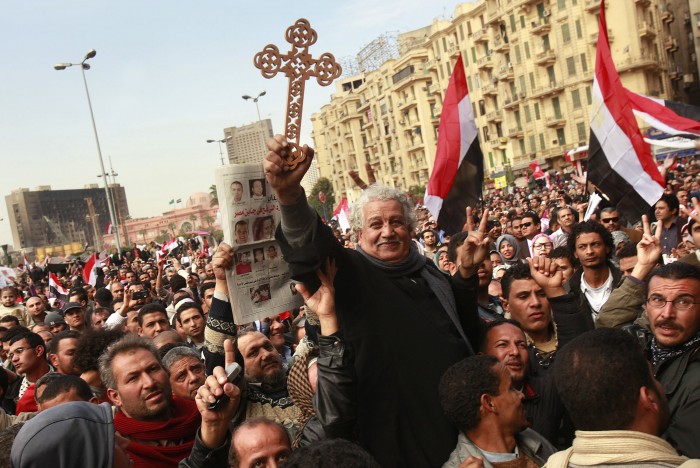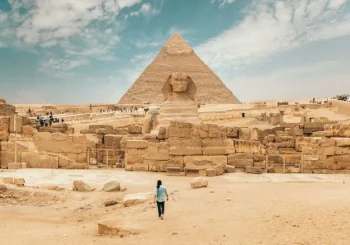By Hanan Fayed, The Cairo Post
“The emigration of Egypt’s Copts is neither wrong nor dangerous; emigration is a human right. Forcible migration, however, is dangerous,” Kamal Zakher, a researcher in Coptic affairs, said at a Sunday discussion on Coptic emigration.
The Egyptian Center for Public Policy Studies (ECPPS) held a seminar on the short documentary “Emigration of Roots,” which tackled the emigration of Copts since the January 25 Revolution in 2011.
“The Nasserite regime neglected the fact that Egypt is a multi-cultural country. Since then, the idea of the one rule, the one thought and the one direction took over,” Zakher said.
Customary sessions replace law
“It is dangerous that the rule of law diminishes in favor of customs,” Zakher said, commenting on customary reconciliation sessions, which he said have become a tradition, especially in rural areas and in Upper Egypt, when a sectarian clash erupts, even if it is originally a merely criminal case.
In Upper Egypt, the concept of tahr, meaning revenge or blood debt, dictates that if a family member is killed, a member of the killer’s family must die, which can often spiral into cycles of violence. Police and court procedures often do not sufficiently redress families’ honor, so reconciliation meetings are seen as a practical means to curb violence and preserve face in the community.
Such sessions are held between the conflicting parties, local officials, and Muslim and Christian clerics to conclude “reconciliation.”
“Unjust conditions are imposed on Christians in these customary sessions but they accept them because they are afraid,” said Mina Thabet, a researcher at the Egyptian Commission for Rights and Freedoms (ECRF.)
Forcible displacement of Copts in some cases a result of customary sessions, Thabet added.
On Aug. 14, 2013, dozens of churches and Coptic properties were burned down and hundreds of Christians were attacked and intimidated in several governorates following the dispersal of the pro-Muslim Brotherhood Rabaa al-Adaweya sit-in, in what many saw as retaliatory attacks.
Delga, a town in Minya, was one of the areas that bore the brunt of Islamists wrath at the military ouster of President Mohamed Morsi.
After repeated pleas by the town’s Copts and reports of arson, movement restrictions, displacement, armed robbery and forcible levies, security forces raided the town in September, arresting dozens of the alleged assailants.
Dozens of Delga Coptic families have not returned to their homes since then because they are afraid, their homes are damaged, or because Muslim locals occupied them, according to Thabet.
In June, a Muslim family in Matareya, Dakahlia, placed construction materials in front of a furniture store owned by a Christian; some furniture was exposed to dust, reported to Sada el-Balad.
Dozens were injured in subsequent clashes, and a Christian killed a Muslim; a number of media reported that this killing was an accident.
The customary reconciliation session compelled the Christian family to slaughter 100 camels and five calves, and provide 134 acres and 1 million EGP ($139,600) to build an orphanage as a donation to the residents of Matariya.
Uprooting Egypt’s Copts?
“Uprooting Copts from Egypt is a myth,” Shafeeq said.
“Forcing 12 million Copts out of Egypt will require a third world war. What they are facing is not even the worst in their history,” he added.
The exact number of the Christian population has been controversial in Egypt; they are estimated at between 10 and 20 percent of the 90 million population.
Since the 1970s, however, Islamists have been able to obtain visas to emigrate abroad on the basis of religious discrimination at a much higher rate than Copts, Shafeeq said.
Islamists in Egypt have been the targets of security crackdowns and détente with the state since the 20thcentury, with stages of violent attacks against state institutions and underground mobilization.
“The most dangerous wave of emigration in Egypt’s history happened in the 80’s, when 16 million Egyptians worked in the Gulf, returning with enormous demographic, sociologic and cultural changes,” Shafeeq said, citing “Wahabi ideology.”
Large-scale emigration of Egyptians began in the early 60s after the indiscriminate nationalization of assets by Nasser, and it so happened that 41 percent of the national fortune at the time belonged to Copts, he added.
Some 3,000 Copts emigrated at the time, mainly to the US, but some Coptic families returned to Egypt afterwards, founding major businesses, Shafeeq said, adding that Islamist immigrants also returned and established companies.
“Christians are an integral and inherent part of the East. They have enriched its intellect, culture and diversity,” said Pastor Refat Fikri, the media and publishing official at Synod of the Nile (the Evangelical Church of Egypt.)
From 2011 to 2013, some 11,600 Copts were granted immigration to the U.S. and Europe, according to Shafeeq.
According to ECRF’s Thabet, 100 to 110 Copts were killed in the same period in sectarian clashes.
“Emigration does not worry me. It is the emigration of Copts within themselves that does; the culture of fear,” Shafeeq added.
Religious reform
“It seems there is insistence to go through the violent European experience of separating religious institutions from the state instead of learning from it,” Fekri said.
President Abdel Fatah al-Sisi criticized the prevalent religious discourse last May as a presidential candidate, saying that “religious discourse in the Islamic World has lost the values of humanity in Islam.”
“If religious texts were taken literally, they would oppose human rights and reject education. If we separate religion from the state, the regime will be neutral towards citizens,” Fekri said.
If religious reform happened, “there would not be emigration or forcible migration; there would be equality and citizenship,” Fekri added.
Al-Azhar, the largest Sunni institution in the Islamic world, has announced efforts to counter extremism and has prevented Salafi preachers from delivering sermons at mosques.
“Wide-spread extremism and atheism make religious reform inevitable,” Fekri said.
In a previous report by The Cairo Post, a Coptic activist said that there is an “intellectual rebellion” in Egyptian churches.
Sahfeeq acknowledged that while Coptic emigration could not be separated from the general Egyptian diaspora that began by the mid-twentieth century and continued due to socioeconomic reasons, Copts have more reasons to relocate themselves.
Anne Abdel Sayed, a university student who appeared in the film, said that “Egyptian women are oppressed.”
“There is ‘national unity’ in Egypt when it comes to patriarchy, regardless of religion and education,” Zakher said, triggering laughs from the attendees.
“Nevertheless, Coptic women in Egypt are persecuted three times; they are women, they are Egyptian, and they are Coptic. If they are Protestant, a minority within a minority, they would have yet another level of persecution,” Synod of the Nile’s Fekri said.
“Yes, we are all persecuted. But some people are more persecuted than the rest.”
Minorities affected by discrimination in Egypt
“Discrimination in Egypt affects all minorities, not just Copts. Bahais, Shiites, Nubians and Bedouins are also affected,” said Thabet.
“The main reasons behind Coptic emigration are sectarianism, social and economic difficulties and the absence of the role of the state,” Thabet said, adding that internal displacement is more dangerous than emigration abroad.
Poor Upper Egyptian immigrants, mostly Christian, have settled in slum conditions outside of Cairo since the 1940s. They mostly work in garbage collection and recycling.
Nubians were displaced from their historic lands several times in the 20th century to leave room to build the Aswan Reservoir, then the High Dam and Lake Nasser, which flooded their villages behind the dam. The ethnic group has complained that they have not been properly compensated since then.
Some Nubians have also migrated from Aswan to Cairo, Alexandria and other cities in the north to find jobs.
For “security purposes,” Bedouins in the Sinai Peninsula are not allowed to legally own the lands where their families have lived for centuries, or serve in the army, although conscription is compulsory for the rest of Egyptian men.
Panel member Suleiman Shafeeq mentioned “injustices” suffered by Bedouins in North Sinai amid the security crackdown on militants in the area.







Comments (13)
[…] Egypt (Egyptian Streets) – The emigration of Egypt’s Copts is neither wrong nor dangerous; emigration is a […]
May you all learn to live together in peace and harmony. Love each other, protect each other. Every human being is a complex creation, created in the image of God. I have faith Egypt can set the standard for the rest of the Middle East. You deserve much congratulations and applause for removing the US supported “Muslim Brotherhood” from power.
lol it’s never going to happen, this is multiculturalism 101, internal violence, instablity, ethnic cleanings, do you know where this doesn’t happen? monocultural, monoracial socities.
That is one sad, sad comment.